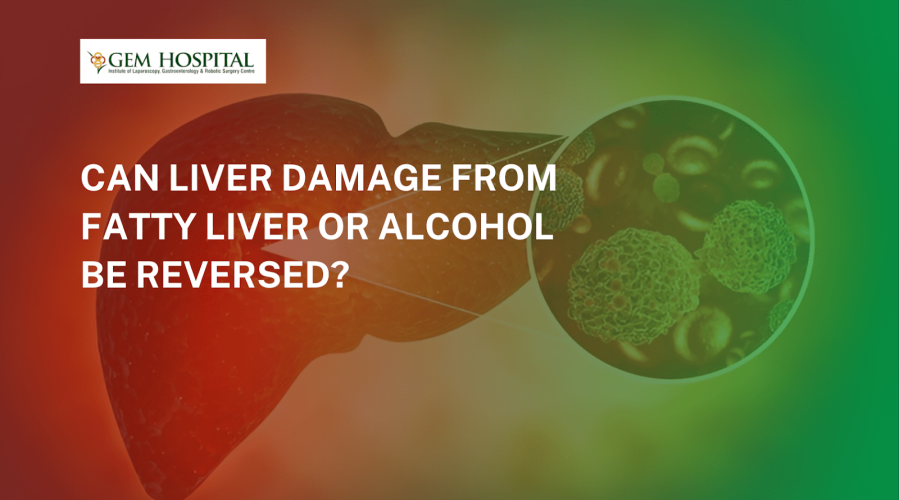Learn what gallstones are, their common symptoms, causes, and treatment options. Discover when to seek medical care and how to manage gallstone complications effectively.
Can Liver Damage from Fatty Liver or Alcohol Be Reversed?

Damaged liver is commonly thought of as long-term drinking or a condition called non-alcoholic fatty liver disease (NAFLD), and is increasingly found due to modern lifestyle and diet practices. But is liver damage permanent? Can it really be reversed or healed with the right approaches? The answer depends on how extensive the damage is and how early we identify it. With timely intervention, liver damage is usually reversible especially in the early stages.
Understanding the Stages of Liver Damage
Liver damage develops gradually and moves through several stages:
- Steatosis (Fatty Liver) – Accumulation of fat in the liver
- Fibrosis – Formation of scar tissue in response to ongoing damage
- Cirrhosis – Severe scarring that disrupts liver function
- Liver Failure – Advanced stage requiring transplant or critical care
How Fatty Liver Damage Can Be Reversed
Non-alcoholic fatty liver disease is often found in those who are obese, have type 2 diabetes, take medication for high cholesterol, and/or live a sedentary lifestyle. Fortunately, if identified early, non-alcoholic fatty liver disease is extremely reversible! Accountability increases with sustainable changes in diet (low saturated fat and refined sugars), activity levels, and blood sugar control, which can lead to improved liver function. Over time, the liver will also slowly regenerate and fibrosis will decrease; for some people with non-alcoholic fatty liver disease, reversing liver damage becomes a reality!
What About Alcohol-Induced Liver Damage?
For individuals with alcoholic liver disease (ALD), the first and most important step to recovery is removing alcohol completely from the diet and lifestyle as even moderate doses of alcohol can cause additional and long-lasting liver damage in inflamed liver tissues. Removing alcohol early enough to allow the liver to heal during the steatosis or mild fibrosis stage, returning to a nearly normal liver function is possible!
In some situations, medications may be necessary for symptom management or management of detoxification. Nutritional therapy is important to those who have been drinking excessively, and are engaging in poor nutrition, as they may have vitamin and mineral deficiencies as a result.
Cirrhosis: Can It Be Reversed?
Once liver damage progresses to cirrhosis, the scarring is typically permanent. However, this doesn’t mean all hope is lost. Even in cirrhosis, lifestyle modifications can prevent further deterioration and improve liver function to some extent. In select cases where the damage is not extensive, regression of fibrosis has been observed with prolonged abstinence and medical treatment.
Advanced cirrhosis may eventually require a liver transplant, but even then, a proactive approach can delay the need for such interventions. It's important to remember that early detection is key when liver damage reversal is still within reach.
When to See a Doctor
The liver can often present with no symptoms until there has already been significant damage to your liver. This is Often why routine testing and check-ups for those most at risk (overweight, diabetes, alcohol consumption, family history of liver disease) is so critical. Fatigue for unknown reasons, unexplained weight loss, jaundice (yellowing of the eyes or skin), or any discomfort in the abdomen that persists are symptoms to never ignore.
When you are evaluated by a liver specialist, they will assess how much damage you have through blood test results, ultrasound, or FibroScan, and will put you on a target treatment for liver damage reversal where possible.
Liver Damage Reversal is Possible But Time is Critical
The most important takeaway is: the sooner you act, the greater your chance of reversing liver damage. Fatty liver and early-stage alcohol-related damage do not have to be life-long conditions! With the right diagnosis, lifestyle changes, and medical assistance, reversing liver damage is very achievable.
Begin Your Healing Journey at GEM Hospital
If you are experiencing signs of liver dysfunction, or if you have already received a diagnosis of fatty liver or alcohol-related liver damage, do not wait any longer. The sooner you act, the better the chance of liver damage reversal.
GEM Hospital's hepatology and gastroenterology teams are experts in advanced liver diagnostics, specialized care, and advanced liver treatments individualized to each patient. Schedule your appointment today and take the first step to supporting your liver, and your quality of life.
Blogs & Article
Learn about bloating and gas problems, including common causes, symptoms, and effective solutions to improve digestion, reduce discomfort, and maintain gut health.
Learn how unverified Ayurveda treatments may cause liver damage, understand the risks, symptoms, and why medical guidance is essential for safe care.


